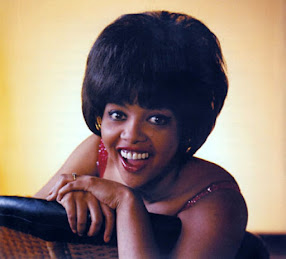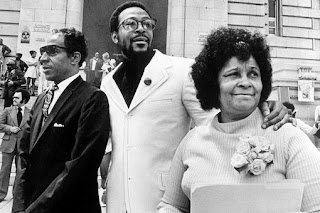Tammi Terrell (April 29, 1945 – March 16, 1970) was an American singer-songwriter, widely known as a star singer for Motown Records during the 1960s, notably for a series of duets with singer Marvin Gaye.
She was born Thomasina Winifred Montgomery in Philadelphia to Jennie, née Graham, and Thomas Montgomery. Jennie was an actress and Thomas was a barbershop owner and local politician. Terrell was the older of two siblings. According to her sister Ludie, she said her parents thought Terrell would be a boy and, therefore, she would be named after her father. When Terrell was born, the parents settled on the name Thomasina, nicknaming her "Tommie". At the age of 11 she won a talent contest. Terrell later changed it to "Tammy" after seeing the film Tammy and the Bachelor and hearing its theme song, "Tammy", at the age of 12.
Terrell attended Germantown High School in Philadelphia and by the age of 13 she was regularly opening club dates for acts including Gary "U.S." Bonds and Patti LaBelle & the Bluebelles. In 1960, Terrell signed under the Wand subsidiary of Scepter Records after being discovered by Luther Dixon. She recording the ballad "If You See Bill" under the name Tammy Montgomery, and did demos for the Shirelles. After another single, Terrell left the label.
Having been introduced to James Brown, she signed a contract with him and began singing backup for his Revue concert tours. In 1961, Terrell created the group the Sherrys. In late 1962, she was kicked out due to multiple disputes. Eventually, they went their separate ways, with the Sherrys moving on without Terrell.
In 1963, she recorded the song "I Cried". Released on Brown's Try Me Records, it became her first charting single, reaching No. 99 on the Billboard Hot 100. Terrell later signed with Checker Records and released the Bert Berns-produced "If I Would Marry You", a duet with Jimmy Radcliffe, which Terrell co-composed. Following this relative failure, Terrell announced a semi-retirement from the music business.
Terrell enrolled in the University of Pennsylvania, where she majored in pre-med, staying at the school for two years. In the middle of this, Terrell was asked by Jerry Butler to sing with him in a series of shows in nightclubs. After Butler arranged to assure Terrell that she could continue her schooling, she began touring with Butler. In April 1965, during a performance at the Twenty Grand Club in Detroit, she was spotted by Motown CEO Berry Gordy, who promised to sign her to Motown.
 |
| Terrell with Sam Cooke & Betty Harris |
Terrell agreed and signed with Motown on April 29, 1965, her 20th birthday. "I Can't Believe You Love Me" became Terrell's first R&B top 40 single, followed almost immediately by "Come On and See Me". In 1966, Terrell recorded two future classics, Stevie Wonder's "All I Do (Is Think About You)" and The Isley Brothers' "This Old Heart of Mine (Is Weak for You)". After the release of her first single on Motown, Terrell joined the Motortown Revue opening for the Temptations.
Terrell was then paired with Marvin Gaye, who previously recorded duets with Mary Wells and Kim Weston. His chemistry with Terrell was immediate and in 1967, they entered the pop Top 20 with the magnificent "Ain't No Mountain High Enough," the first in a series of lush, sensual hits authored by the husband-and-wife team of Nickolas Ashford and Valerie Simpson. "Your Precious Love" cracked the Top Five a few months later and in 1968, the twosome topped the R&B charts with both "Ain't Nothing Like the Real Thing" and "You're All I Need to Get By." The success of these later hits was nevertheless tempered by Terrell's off-stage travails -- after an extended period of severe migraine headaches, in 1967 she collapsed in Gaye's arms while in concert at Virginia's Hampton-Sydney College, and was diagnosed with a brain tumor.
Although the tumor forced Terrell to retire from performing live, she continued to record with Gaye even as her health deteriorated; however, as time went on, Valerie Simpson herself assumed uncredited vocal duties on a number of hits, including 1969's "Good Lovin' Ain't Easy to Come By" and "What You Gave Me." (For several other tracks, Gaye's vocals were added to pre-existing Terrell solo recordings.)
In all, Terrell endured eight operations, ultimately resulting in loss of memory and partial paralysis; she finally died in Philadelphia on March 16, 1970. Gaye was so devastated by her decline and eventual passing that he retired from the road for three years; her loss also contributed greatly to the spiritual turmoil which informed his 1971 masterpiece What's Going On. At the time of her death, Tammi Terrell was just 24 years old.
(Edited from Wikipedia & AllMusic)















